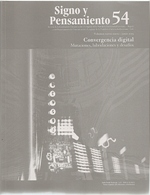Abstract
The text analyzes the contemporary mutation of the public sphere as an effect of the extension of cyberspace and contemplates the new possibilities of development that this mutation opens up to democracy, particularly to collective deliberation. After recalling the quantitative data concerning the extension of digital communication and describing the progress of social computing, the major trends of the new public sphere are presented: its global reach, its structure of "all towards all" and "equal" like "the same as the fading private / public distinction. However, the new possibilities of democratic collective understanding can only be fully realized if the problems of semantic interoperability posed by the multiplicity of languages and the incompatibility of classification systems are resolved.
Corina, P. (2008), An Empirical Analysis of the Creation, Use and Adoption of Social Computing Applications, European Commission, Joint Research Centre and Institute for Prospective Technological Studies.
Feigenbaum, F.; and ALII. (2007), «The semantic Web in Action», en : Scientific American, December 2007, p. 90-97.
Lévy, P. (1994), L’intelligence collective. Pour une anthropologie du cyberespace, Paris, La Découverte.
— (1995), Qu’est-ce que le virtuel ?, Paris, La Découverte.
— (1997), Cyberculture, Paris, Odile Jacob.
— (2000), World Philosophie (le marché, le cyberespace, la conscience), Paris, Odile Jacob.
— (2002), Cyberdémocratie (Essai de philosophie politique), Paris, Odile Jacob.
— (2010), à paraître L’espace sémantique, London, Hermes.
Li, C.; Bernoff, J. (2008), Groundswell. Winning in a World Transformed by Social Technologies, Business Press, Harvard.
Surowiecki, J. (2004), The wisdom of the Crowds, London, Random House. Tapscott, D.,
Williams, A.D. (2007), Wikinomics, How Mass Collaboration Changes Everything. Portfolio.
Tovey, M. (Ed.) (2008), Collective Intelligence: Creating a Prosperous World at Peace, Oakton, VA: EIN Press.
Weinberger, D. (2007), Everything Is Miscellaneous: The Power of the New Digital Disorder, Henri Holt and Cie, USA.
Wellman, B. (2001), Computer networks as social networks. Science, 293 (14 September), p. 2031-2034.
Yochai, B. (2006). The Wealth of Networks: How Social Production Transforms Markets and Freedom, Yale, University Press.
This journal is registered under a Creative Commons Attribution 4.0 International Public License. Thus, this work may be reproduced, distributed, and publicly shared in digital format, as long as the names of the authors and Pontificia Universidad Javeriana are acknowledged. Others are allowed to quote, adapt, transform, auto-archive, republish, and create based on this material, for any purpose (even commercial ones), provided the authorship is duly acknowledged, a link to the original work is provided, and it is specified if changes have been made. Pontificia Universidad Javeriana does not hold the rights of published works and the authors are solely responsible for the contents of their works; they keep the moral, intellectual, privacy, and publicity rights.
Approving the intervention of the work (review, copy-editing, translation, layout) and the following outreach, are granted through an use license and not through an assignment of rights. This means the journal and Pontificia Universidad Javeriana cannot be held responsible for any ethical malpractice by the authors. As a consequence of the protection granted by the use license, the journal is not required to publish recantations or modify information already published, unless the errata stems from the editorial management process. Publishing contents in this journal does not generate royalties for contributors.


